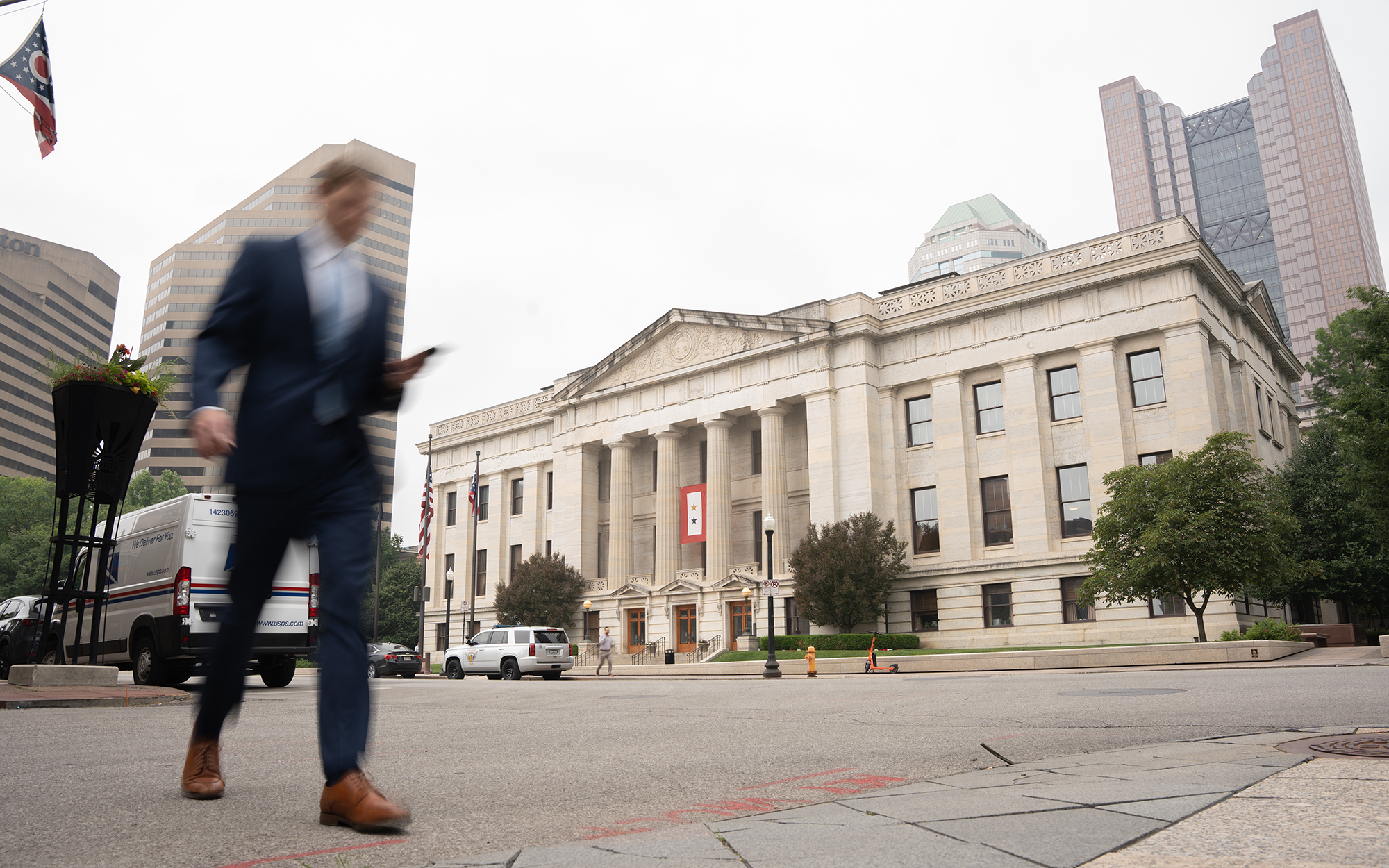
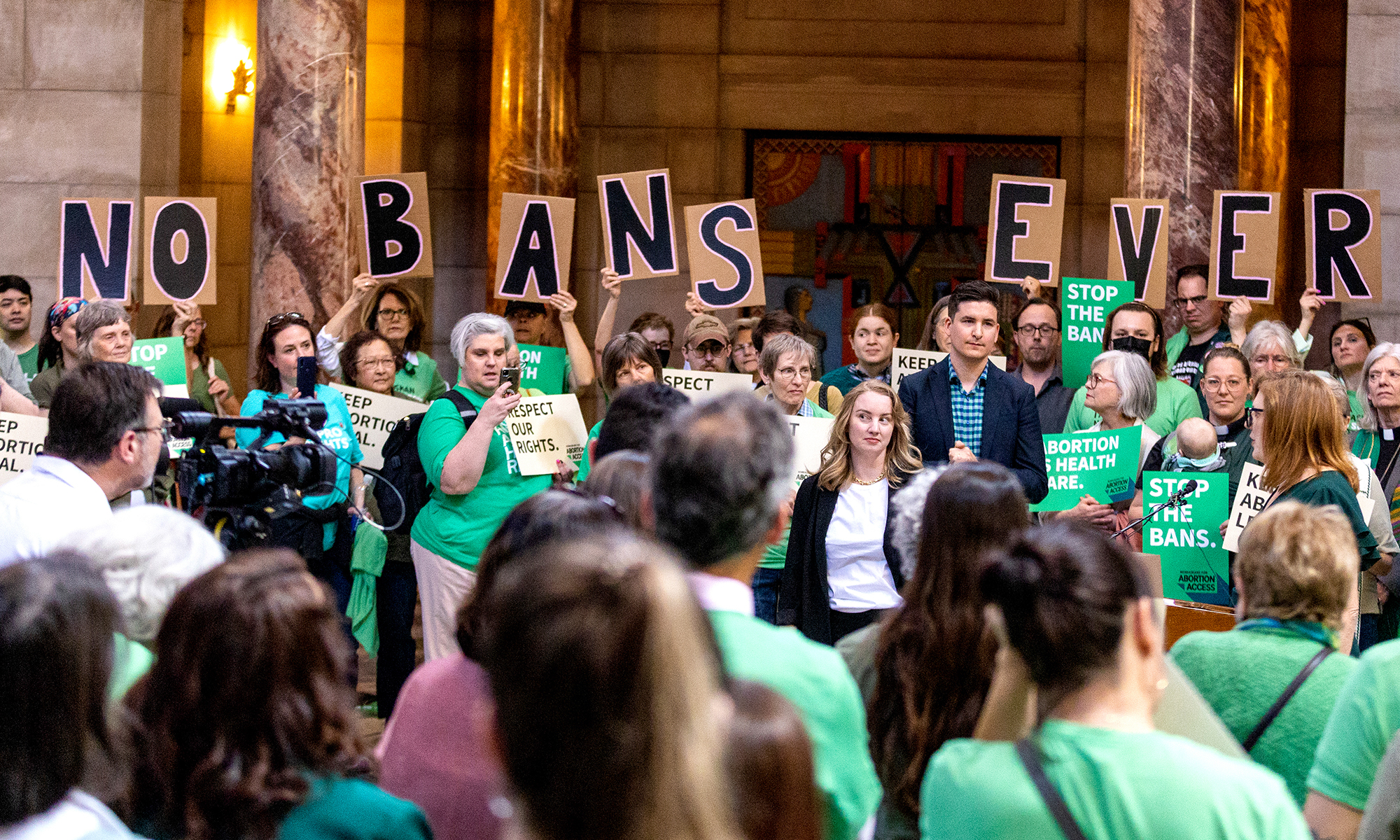
Abortion-rights advocates rally in the Nebraska Capitol rotunda on April 12, 2023, in opposition to the Nebraska Heartbeat Act, which would have banned abortion around six weeks. The bill did not pass, but a 12-week ban is now law. (Photo by Joseph Kual Zakaria/News21)
‘Confusing’ and ‘chilling’: First legislative sessions after Roe produce patchwork of laws on abortion
The first full state legislative sessions after the fall of Roe v. Wade produced hundreds of bills that are all over the map on abortion, including proposals to do what was once considered unthinkable: criminalize pregnant people themselves.
Our content is free to use with appropriate credit. See the terms.
A year after the U.S. Supreme Court returned regulation of abortion to the states, the first full legislative sessions post-Roe v. Wade produced a lot of confusion and little agreement, with more extreme measures going so far as to propose criminalizing pregnant people – once unthinkable on all sides of the debate.
News21 spent months analyzing more than 550 abortion-related bills introduced this year in all 50 states – and found that the biggest loser was compromise.
“I think we’re in this strange period of kind of shock after Roe v. Wade being overturned,” said Eric Scheidler, executive director of the anti-abortion Pro-Life Action League, based in Illinois.
“I’m trying to be patient and … watch what we can learn about the policies that have been implemented in different states. Then maybe we’ll start to be able to approach this more rationally and seek more common ground.”
Rather than bipartisan consensus, 2023 brought conflicting action across the land, often based on which party holds power where.
Just one example: Several Republican-led states sought to stop abortion-seekers from crossing state lines, and one – Idaho – succeeded in making it a crime to help a minor get an out-of-state abortion. At the opposing end, other states increased protections for nonresidents obtaining abortions and shielded providers and patients from investigations initiated in restrictive states.
In several places, protesters took to statehouse rotundas and galleries to condemn lawmakers in vitriolic displays that at times disrupted debate. Such was the case in Nebraska, where security was called to clear the visitors’ gallery after outbursts during debate over a measure that included both a 12-week abortion ban and a ban on gender-affirming surgery for minors. That bill is now law.
Very few bills dealt with securing the middle ground, where most Americans sit on abortion. A record-high 69% of Americans believe abortion should generally be legal in the first three months of pregnancy, according to a recent Gallup poll. Fifty-two percent think abortion is morally acceptable, and 61% said overturning Roe v. Wade was a “bad thing.”
Coupled with ongoing court challenges that have even experts unsure of the legal landscape from state to state, the efforts of elected officials have left many of those whom they serve confounded and concerned.
“Every week, mostly patients from North Dakota will say, ‘Is it even legal for me to come there? Will I get prosecuted for this health care?’” said Tammi Kromenaker, director of Red River Women’s Clinic, which moved from Fargo, North Dakota, to Moorhead, Minnesota, after North Dakota banned almost all abortions.
In Oklahoma, Kailey Voellinger worked for three years as clinic director of the abortion-rights organization Trust Women Foundation. Lawsuits and a slew of new legislation have left her uncertain of how to advise patients.
In late May, that state’s Supreme Court ruled that two laws banning abortion were unconstitutional. Nevertheless, a near-total ban on abortion remains in place, except in life-threatening situations.
“The way that these bills are written are specifically written to be confusing. They’re explicitly written to terrify people,” Voellinger said.
“These laws are intended to create fear and shame around health care, and it’s deeply frustrating to watch it happen over and over, state to state.”
Attacks and counterattacks
Lawmakers on both sides of the debate introduced many bills designed to counter what the opposition was doing in other states – in many cases their neighbors.
At least three legislatures in abortion-restricted states – Texas, Florida and Idaho – tried to stop their residents from crossing state lines to get the procedure. Idaho’s “abortion trafficking” bill became law, making it a crime, punishable by two to five years in prison, to obtain abortion medication for minors or help minors go out of state for an abortion without parental consent.
Abortion access states responded, with at least 11 of them introducing legislation to increase safeguards for nonresidents seeking abortions and to prohibit participation in out-of-state investigations.
Three weeks after the Idaho law was signed, the “Shield Law” took effect in neighboring Washington state to protect patients from out-of-state subpoenas and criminal investigations that seek information about abortion services. It also precludes the governor from extraditing someone on charges related to reproductive health care.
An Illinois measure, awaiting action by the governor, prevents license plate data from being sold, shared or transferred to states that deny the right to an abortion.
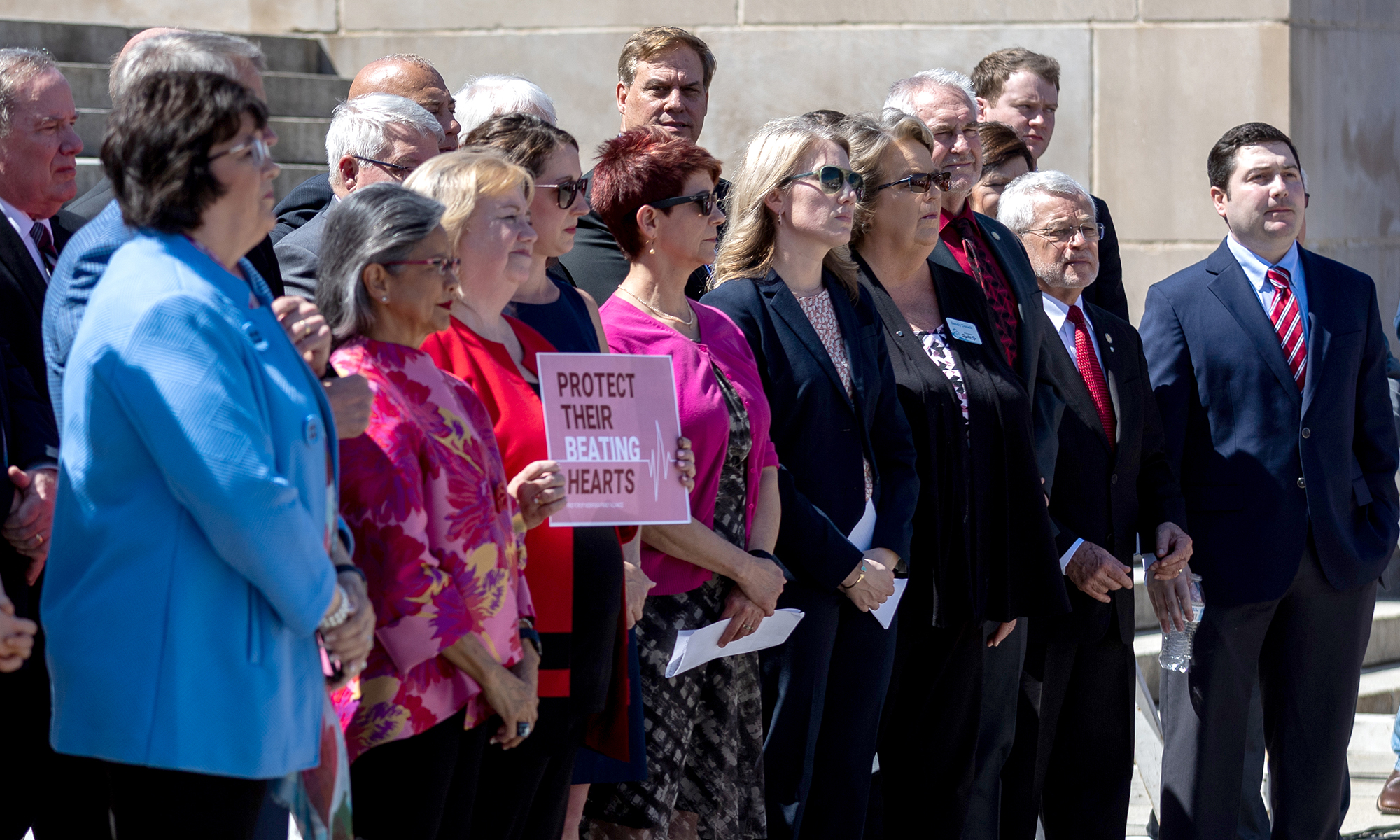
Nebraska legislators pose with anti-abortion advocates at a rally on the north steps of the state Capitol in support of a bill to ban abortion at about six weeks. That measure failed to advance, but lawmakers did pass a 12-week ban. (Photo by Joseph Kual Zakaria/News21)
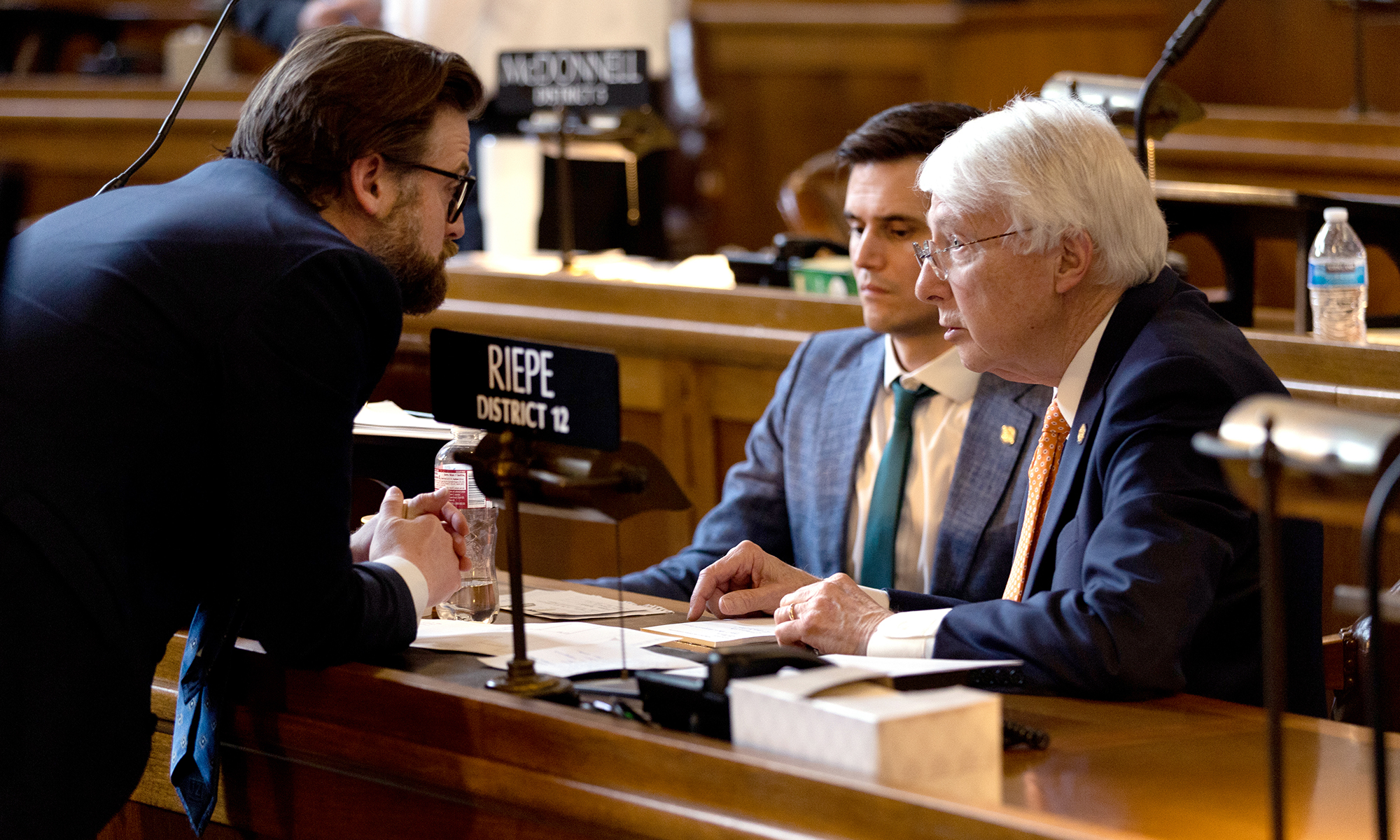
From left, Nebraska Sens. George Dungan III, John Fredrickson and Merv Riepe talk on the floor of the Legislature on April 26, 2023. Lawmakers debated a bill to ban abortion at approximately six weeks of pregnancy, but Riepe, a Republican, abstained from the vote, thus killing the bill. (Photo by Joseph Kual Zakaria/News21)
Another interstate battle broke out over so-called “crisis pregnancy centers,” nonprofit facilities that aim to dissuade people from getting an abortion. Critics of the centers, including the American College of Obstetricians and Gynecologists, say they are unlicensed in many cases, staffed by volunteers instead of medical professionals and misinterpret medical information.
At least nine states passed laws to increase public funding for the centers, while others – including Colorado, New Jersey and Illinois – pursued bills to crack down on the facilities if they provide false information to pregnant people or misuse client data.
Colorado’s new law, on hold amid court challenges, makes it a deceptive trade practice to disseminate false information related to abortion or emergency contraceptive services, with violators facing potential fines of up to $20,000.
“The bill does not aim to shut down pregnancy centers,” said the sponsor, Democratic Rep. Karen McCormick. “Faith-based counseling is absolutely wonderful for people who are seeking that. … All we’re asking is that these centers be completely transparent about what they provide and what they don’t provide.”
The law also prohibits the promotion of “medication abortion reversal,” administering medication to try to reverse the effects of the abortion pill. The American College of Obstetricians and Gynecologists notes that “claims regarding abortion ‘reversal’ treatment are not based on science and do not meet clinical standards.”
Colorado
-
Abortion landscape
- Access: Abortion is legal at all stages of pregnancy.
- Political backdrop: The House and Senate are controlled by Democrats. Gov. Jared Polis is also a Democrat.
-
2023 legislative highlights
- Anti-abortion centers: A new law makes it a deceptive trade practice for so-called “crisis pregnancy centers” to disseminate false information about services such as abortions, emergency contraception and so-called “medication abortion reversal.” Anyone who attempts “medication abortion reversal” would be subject to discipline, but state boards are reviewing this before it takes effect.
- Parental consent: A new law allows health care providers to give minors contraceptives and information.
- Prosecution: A new shield law protects patients and health care providers.
- Insurance: A law requires large employer health insurance plans, with some exceptions, to cover the cost of abortions starting in 2025.
Meanwhile in neighboring Kansas, a new law, also on hold amid court challenges, requires clinics providing medication abortions to post “conspicuous” signage in boldface type telling patients their abortions can be reversed. That state also increased funding to pregnancy centers.
In yet another example of legislative one-upmanship, some states offered competing bills focused on the licensing of medical professionals involved in abortion care.
Doctors in South Carolina could have their licenses revoked for performing abortions under a new law in that state. On the flip side, a new Minnesota law forbids state boards from denying licenses to doctors who face disciplinary action or are convicted out-of-state for performing abortions.
Minnesota
-
Abortion landscape
- Access: Abortion is legal until fetal viability, about 24-26 weeks of pregnancy, and to protect the life and health of the mother.
- Political backdrop: The House and Senate are controlled by Democrats. Gov. Tim Walz is also a Democrat.
-
2023 legislative highlights
- Medical professional licensing: A new law allows physicians, nurses and pharmacists to obtain a medical license, even if they were disciplined for performing an abortion in another state, and shields them from extradition.
- Prosecution: The same law limits the release of health records in cases related to reproductive health and restricts the enforcement of subpoenas and extradition of people charged in other states in cases related to abortion.
“It makes it kind of confusing about what states have passed what laws. Where is it safe to get a license or not get a license? And then what happens afterwards?” said Dr. Kristyn Brandi, an OB-GYN in New Jersey and fellow for the American College of Obstetricians and Gynecologists.
Brandi has seen her profession change and her colleagues forced to alter their practices due to this back-and-forth.
“A lot of these things, really all of this legislation, a lot of the impact is just a chilling effect of making sure providers are scared to provide this care,” she said. “And that’s only going to hurt patients.”
‘Culture of life’ trend
In a legislative year dominated by division, one point of unity emerged: measures promising more services and health coverage for women and children – or so-called “culture of life” bills.
Six states, all but one with tight abortion restrictions, passed laws to expand maternal and child support programs and funding for alternatives to abortion – despite past aversions to using public money on social programs.
In Mississippi, a new law requires the state to create a website and app to provide resources about adoption assistance, pregnancy supplies and prenatal and postpartum care. The state has one of the highest rates of maternal mortality in the nation and state spending on child welfare programs fell by more than half in the last decade.
“We sit here today with three or four or five thousand additional pregnant mothers that we didn’t have before last year,” the bill’s sponsor, Republican state Sen. Bart Williams, said during a February Senate session. “This gives them a resource.”
Another Mississippi law makes it easier to leave unwanted infants at safe dropoff locations in buildings such as firehouses. The state also expanded Medicaid assistance from 60 days to a year after an individual gives birth and established an income tax credit of up to $10,000 for adopting a child who lives in Mississippi and $5,000 for adopting a child outside of the state.
Mississippi
-
Abortion landscape
- Access: Abortion is banned, except to save a pregnant person’s life or in cases of rape.
- Political backdrop: The House and Senate are controlled by Republicans. Gov. Tate Reeves is also a Republican.
-
2023 legislative highlights
- Anti-abortion centers: A new law expands the aggregate amount of tax credits for donations to so-called “crisis pregnancy centers” from $3.5 million to $10 million.
- Insurance: A new law expands postpartum Medicaid assistance up to a year.
- Family support: A new state-run website and app will provide pregnant people with resources on adoption assistance, pregnancy supplies, and prenatal and postpartum care.
Georgia, North Dakota and Kansas approved similar laws to increase public support for mothers and children, while Texas increased funding to its “Alternatives to Abortion” program.
‘It’s an experiment’
From trying to regulate whether abortion medication can be sent via the U.S. mail to punishing prosecutors who don’t take on abortion cases, this year’s sessions produced a slew of bills that went far beyond abortion regulation itself.
“There are a lot of untested ideas. It’s an experiment,” said Elizabeth Nash, former principal policy associate at the Guttmacher Institute, an abortion rights organization that tracks legislation.
Texas, which Nash and others point to as a leader in this type of exploratory legislation, introduced an array of bills that could serve as prototypes for other states in coming years. Even before the overturn of Roe v. Wade, the state produced SB 8, the model trigger law banning abortion upon detection of a “fetal heartbeat.” Many states followed.
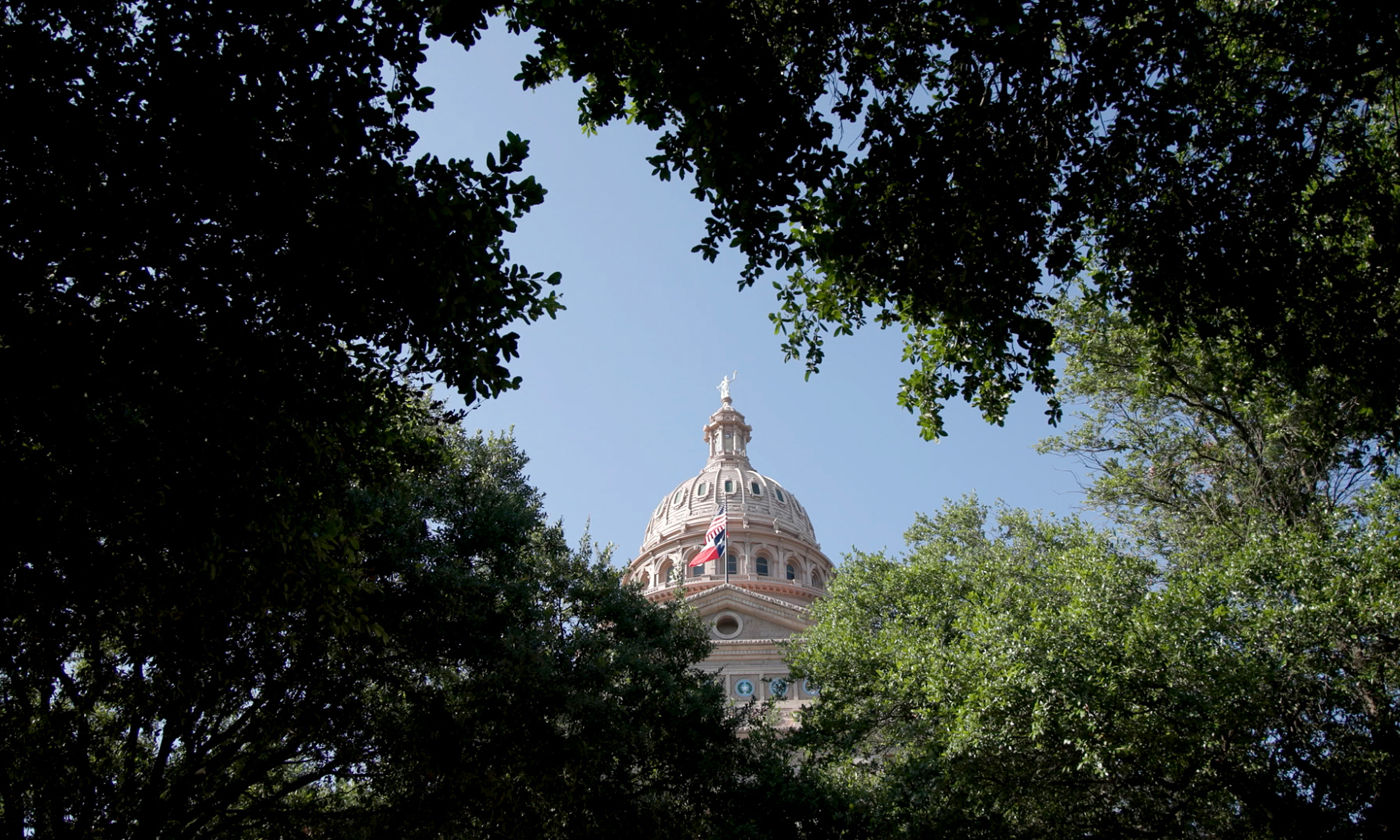
Anti-abortion advocates point to Texas as a leader of exploratory abortion legislation that could serve as prototypes for other states. (Photo by Joseph Kual Zakaria/News21)
States are watching other Texas moves, including a new law that allows the removal of district and county attorneys if they refuse to prosecute certain criminal offenses or instruct law officers to not arrest people for particular offenses.
“Texans unapologetically believe in the rule of law and expect their judges and district attorneys to follow Texas law,” Lt. Gov. Dan Patrick said in a statement, noting that passage of the law – along with an unsuccessful measure targeting judges – were two of his top priorities.
“These bills send a clear message that their delinquent behavior will not be tolerated.”
Though the law doesn’t include the word “abortion,” it was drafted after five Texas DAs signed onto a pledge from prosecutors across the U.S. who vowed to use their discretion to decline to criminalize reproductive health decisions.
“We stand together in our firm belief that prosecutors have a responsibility to refrain from using limited criminal legal system resources to criminalize personal medical decisions,” the statement reads.
Georgia passed a similar law, creating a commission to remove prosecutors who engage in “willful misconduct” or who demonstrate “persistent failure” to carry out duties.
Experts note that prosecutors have long had the discretion to decide what cases they take or pass on and said such laws could have wide-ranging ramifications that go beyond abortion.
David Toscano, a former Virginia legislator and author of “Fighting Political Gridlock: How States Shape Our Nation and Our Lives,” said these efforts are part of a larger move by legislators in more conservative areas to “inhibit prosecutors in urban, more blue or Democratic areas.”
“Politically it’s fascinating,” he said.
Added Nash: “These are the kinds of bills that could get picked up by other states, so that’s why watching Texas is important.”
Testing the waters
This year’s legislative sessions also saw dozens of so-called “messaging bills” – measures intended to steer the larger narrative around abortion and test the waters of public opinion.
One of the more common efforts centered on criminalizing not just doctors who provide abortions – but the pregnant individuals who receive one.
Bills in South Carolina, Kentucky, Georgia, Alabama and Arkansas would have made abortion subject to the same penalties as homicide. Other bills proposed in Oklahoma, Indiana and Texas would have eliminated legal provisions that previously protected people who get an abortion from criminal prosecution.
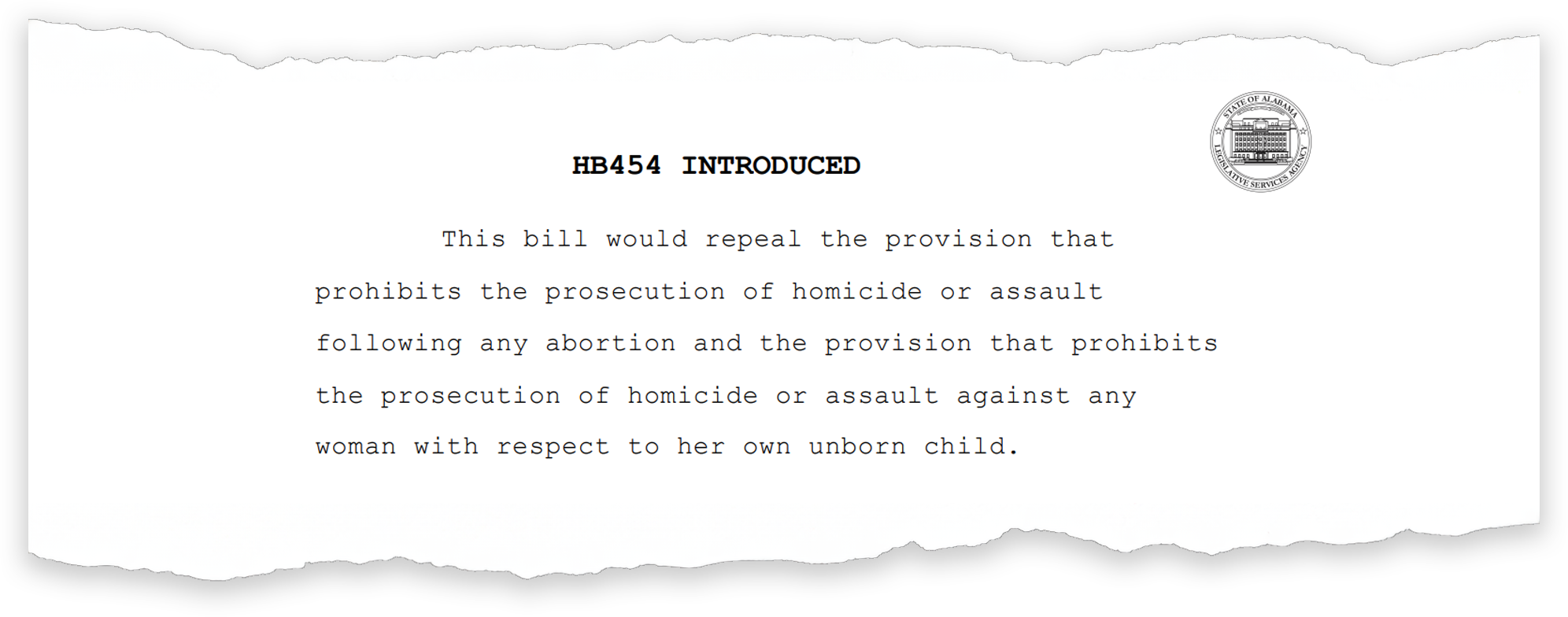
A bill introduced in the Alabama Legislature would have made abortion subject to homicide penalties.
None of these made it out of committee. But some did make national news and live on as a fringe position in the mainstream conversation.
South Carolina, specifically, stood out because homicide penalties in the state can include the death penalty. Headlines like this one in HuffPost were all over the internet: “Death Penalty For Abortions Is On The Table In South Carolina.”
Legislators in at least 17 states also proposed so-called ‘‘born-alive’’ bills assigning personhood status to a fetus. The bills in Montana and Kansas became law. Both require medical professionals to perform life-saving care on a fetus that survives an abortion or otherwise face penalties.
Such measures seem to be trying to fill a gap that doesn’t exist.
The Born-Alive Infants Protection Act of 2002, signed into law by former President George W. Bush, establishes legal personhood status to “every infant member of the species homo sapiens who is born alive at any stage of development” and entitles them to protection under the law.
Kansas Gov. Laura Kelly vetoed her state’s measure, but it was overridden by the more conservative Legislature.
“This bill is misleading and unnecessary,” Kelly said in a statement, adding that its real intent is to “interfere in medical decisions that should remain between doctors and their patients.”
Kansas
-
Abortion landscape
- Access: Abortion is banned after 22 weeks of pregnancy.
- Political backdrop: The House and Senate are controlled by Republicans. Gov. Laura Kelly is a Democrat.
-
2023 legislative highlights
- Born alive: The state’s new “born-alive” law requires health care providers to provide the same level of care to a fetus “born alive” at any stage of development. The Legislature overrode the governor’s veto to enact the legislation.
- Family support: The Legislature appropriated $2 million to the “Alternatives to Abortion” program, to promote childbirth and fund so-called “crisis pregnancy centers,” adoption assistance and maternity homes.
- Overall: A new law, which is being challenged in court, requires health care offices to post signs informing patients about “medication abortion reversal,” which medical experts say is not rooted in science. The Legislature overrode the governor’s veto.
Democratic lawmakers in Republican-dominated states like Missouri and South Carolina also offered up some of these messaging proposals – which went nowhere – to reverse abortion bans or propose constitutional protections.
Meanwhile, bills requiring providers to offer or perform an ultrasound on individuals seeking abortions were introduced in the blue states of Illinois, Maine, Maryland, New York, Oregon and Hawaii. They, too, went nowhere.
Scheidler, of the Pro-Life Action League, is frustrated with the effect that “messaging bills” are having on the national abortion debate.
“Seems like every time we start to get somewhere with a productive conversation, it shifts to extremism, and we’re not able to have that conversation,” he said. “They’re using … the legislative process to make a statement or to prove the purity of their convictions.
“I think it’s ultimately kind of selfish, self-serving. It’s about bragging rights or being able to say to the most extreme people, ‘Look what I did. Look what I support.’”
“Seems like every time we start to get somewhere with a productive conversation, it shifts to extremism, and we’re not able to have that conversation. They’re using … the legislative process to make a statement or to prove the purity of their convictions.”
— Eric Scheidler
Pro-Life Action League executive director
Wait and see
Though most of this year’s legislative sessions have concluded, the political wrangling over abortion rights goes on. Court challenges, ballot initiatives and the 2024 election season will continue to shape and reshape the legal landscape around reproductive rights.
Timothy Krebs, a professor of American politics at the University of New Mexico, believes that only Congress will be able to fully settle the issue.
Democrats have vowed to work to codify abortion rights into law, but without a majority in Congress, that seems unlikely. Many Republicans, on the other hand, are pushing a national ban.
“We’ll wait and see what happens after the 2024 election and the changes that might come from the national level. That’s the only thing short of the Supreme Court reversing itself on the question,” Krebs said. “Otherwise, it’s just going to be each state’s individual decisions and preferences. And we’ve seen how that’s worked out.”
As the debate rages, the only sure thing is that state lawmakers have succeeded in forever altering access to reproductive care in America.
“It scares me as a mom to realize that my kids don’t have what I had,” said McCormick, the Colorado lawmaker. “I was in high school when Roe v. Wade happened, and it’s really concerning to me that things that we tend to take for granted are slipping away.”
News21 reporters Maddy Keyes, Elise Catrion Gregg and Joseph Kual Zakaria contributed to this report.
Our content is free to use with appropriate credit. See the terms.








